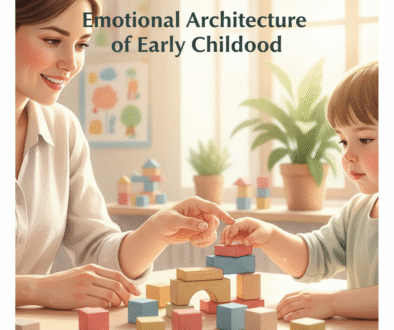
The Brain Truth About Toddlers: Why They Don’t Listen
Let me set the scene.
You’re in a classroom—or maybe at home. Your nerves are hanging by a thread, you’ve said the same instruction five times, and the tiny human in front of you has once again decided that the floor is where the crayons belong. You raise your voice, thinking surely now they’ll listen. But no. They blink. Maybe smile. Maybe continue chewing on a sticker.
Meanwhile, you’re one emotional tremor away from launching yourself into a closet and locking the door with a pack of chocolate, glass of some and Wi-Fi.
Now, before you start Googling “Is my child broken?”, let me reassure you: they’re not. Their brain is just… three. Or four. Or somewhere in that developmental Bermuda Triangle where logic goes to sunbathe and executive functioning hasn’t even packed its suitcase.
The Brain Truth You Weren’t Told
Here’s the unpopular neurological truth: children under five are running on a very enthusiastic but wildly underqualified operating system. Their prefrontal cortex (the sensible adult in the room) is still on factory settings. Meanwhile, their limbic system (the part that screams “danger!”, “fun!”, or “what’s that smell?”) is working overtime.
So when you shout? You’re not getting through. You’re simply becoming another part of their already overstimulated environment. It’s like yelling into a snow globe—they see the movement, feel the shake, but can’t quite catch the message through the glitter storm.
Their brain isn’t saying “I don’t care.” It’s saying “I’m overwhelmed.”
And Yet—You’re Supposed to Stay Calm?
Now let’s talk about you.
You, the teacher expected to smile like a sunflower while suppressing a category 5 meltdown. You, the parent who hasn’t peed in peace since 2019. You who knows all this brain science and still, on some days, would happily sell your soul for 10 minutes of silence and a room without Lego landmines.
I know the script. I’ve lived it.
As a teacher, I’ve stood there smiling while my inner voice screamed into the void. As a mother, I’ve yelled, begged, cried, and once—I’ll admit—thrown a toy truck across the room just to let the volcano inside me erupt. It wasn’t my proudest moment. The boys got scared. I got scared. Then came the shame. And the regret. The kind that clings to your ribs years later like gum under a school desk.
But that’s where the real shift happened.
I started reading. Listening. Watching. Not just my children—but myself. And what I saw was this:
They weren’t trying to make my life harder. They were trying to survive theirs—with a brain still downloading the latest emotional update.
So, What Actually Works (When You’d Rather Scream)?
Here’s the thing: we don’t need magic phrases or perfect Pinterest parenting. What we need is understanding—of them, and of ourselves. So:
-
Lower your voice. Calm cuts through chaos. Yelling just adds more noise to their already overstimulated brain soup.
-
Get low. Eye level. Gentle touch. Show them you’re here—not hovering above like an angry skyscraper.
-
Regulate YOU first. Hard, I know. But your nervous system sets the tone. They borrow your calm until they can find their own.
-
Apologize. Not because you’re weak—but because you’re human. Model repair. Teach them that mistakes aren’t monsters—they’re moments.
The Final (Slightly Unhinged but Loving) Truth
Children aren’t mini adults with bad manners. They’re growing humans with raw brains, sensitive hearts, and the emotional range of a Shakespearean cast on espresso.
They don’t need perfection.
They need connection.
They need us—even on the days when we want to put ourselves in time-out.
So next time your child doesn’t “listen,” remember: maybe they didn’t hear your words over the noise in their own head. And well, possibly what they needed wasn’t a louder voice—but a quieter presence.
And if all else fails? Step into the hallway, take a deep breath, whisper “prefrontal cortex,” and remember that you’re doing your best—with a brain that’s also tired, stressed, and maybe three snacks short of sanity.
We all are.
And that, my friend, is more than enough.


